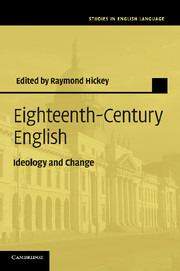Book contents
- Frontmatter
- Contents
- List of figures
- List of maps
- List of tables
- Notes on contributors
- Preface
- 1 Attitudes and concerns in eighteenth-century English
- 2 Prescriptivism and the suppression of variation
- 3 Women's grammars
- 4 Eighteenth-century women and their norms of correctness
- 5 Lowth as an icon of prescriptivism
- 6 Queeney Thrale and the teaching of English grammar
- 7 Coalitions, networks, and discourse communities in Augustan England: The Spectator and the early eighteenth-century essay
- 8 Contextualising eighteenth-century politeness: social distinction and metaphorical levelling
- 9 Expressive speech acts and politeness in eighteenth-century English
- 10 Variation and change in eighteenth-century English
- 11 Variation in sentential complements in eighteenth- and nineteenth-century English: a processing-based explanation
- 12 Nationality and standardisation in eighteenth-century Scotland
- 13 English in eighteenth-century Ireland
- 14 Changes and continuities in dialect grammar
- 15 ‘Be pleased to report expressly’: the development of a public style in Late Modern English business and official correspondence
- 16 Registering the language – dictionaries, diction and the art of elocution
- Timeline for the eighteenth century
- References
- Late modern English language studies
- Indexes
7 - Coalitions, networks, and discourse communities in Augustan England: The Spectator and the early eighteenth-century essay
Published online by Cambridge University Press: 06 December 2010
- Frontmatter
- Contents
- List of figures
- List of maps
- List of tables
- Notes on contributors
- Preface
- 1 Attitudes and concerns in eighteenth-century English
- 2 Prescriptivism and the suppression of variation
- 3 Women's grammars
- 4 Eighteenth-century women and their norms of correctness
- 5 Lowth as an icon of prescriptivism
- 6 Queeney Thrale and the teaching of English grammar
- 7 Coalitions, networks, and discourse communities in Augustan England: The Spectator and the early eighteenth-century essay
- 8 Contextualising eighteenth-century politeness: social distinction and metaphorical levelling
- 9 Expressive speech acts and politeness in eighteenth-century English
- 10 Variation and change in eighteenth-century English
- 11 Variation in sentential complements in eighteenth- and nineteenth-century English: a processing-based explanation
- 12 Nationality and standardisation in eighteenth-century Scotland
- 13 English in eighteenth-century Ireland
- 14 Changes and continuities in dialect grammar
- 15 ‘Be pleased to report expressly’: the development of a public style in Late Modern English business and official correspondence
- 16 Registering the language – dictionaries, diction and the art of elocution
- Timeline for the eighteenth century
- References
- Late modern English language studies
- Indexes
Summary
As, on the one Side, my Paper has not in it a single Word of News, a Reflection in Politics, nor a Stroak of Party; so on the other, there are no Fashionable Touches of Infidelity, no obscene Ideas, no Satyrs upon Priesthood, Marriage, and the like popular Topics of Ridicule; no private Scandal, nor any Thing that may tend to the Defamation of particular Persons, Families, or Societies. Spectator, No. 262. Monday 31 December 1711.
Introduction
Early eighteenth-century London saw the establishment of an energetic literary community of men (and some women), who shared political ambitions and literary interests. They pursued their ambitions and practised their interests in a number of ways, including the social-political forum of the Whig-sponsored Kit Cat Club, and through collaboration in publication ventures. The long association of publisher Jacob Tonson and poet John Dryden provided a model for collaborative work. They had given many young writers a start in literary London by encouraging contributions to Dryden's Miscellanies. By 1710 this function had been assumed by Joseph Addison, who launched the Spectator with Richard Steele. These men forged a network of interests based on their politics, their literary interests, and their search for patronage from the most powerful men in the government of the day, the Whig grandees, including Charles Montagu, the Earl of Halifax, Chancellor of the Exchequer.
- Type
- Chapter
- Information
- Eighteenth-Century EnglishIdeology and Change, pp. 106 - 132Publisher: Cambridge University PressPrint publication year: 2010
- 11
- Cited by

